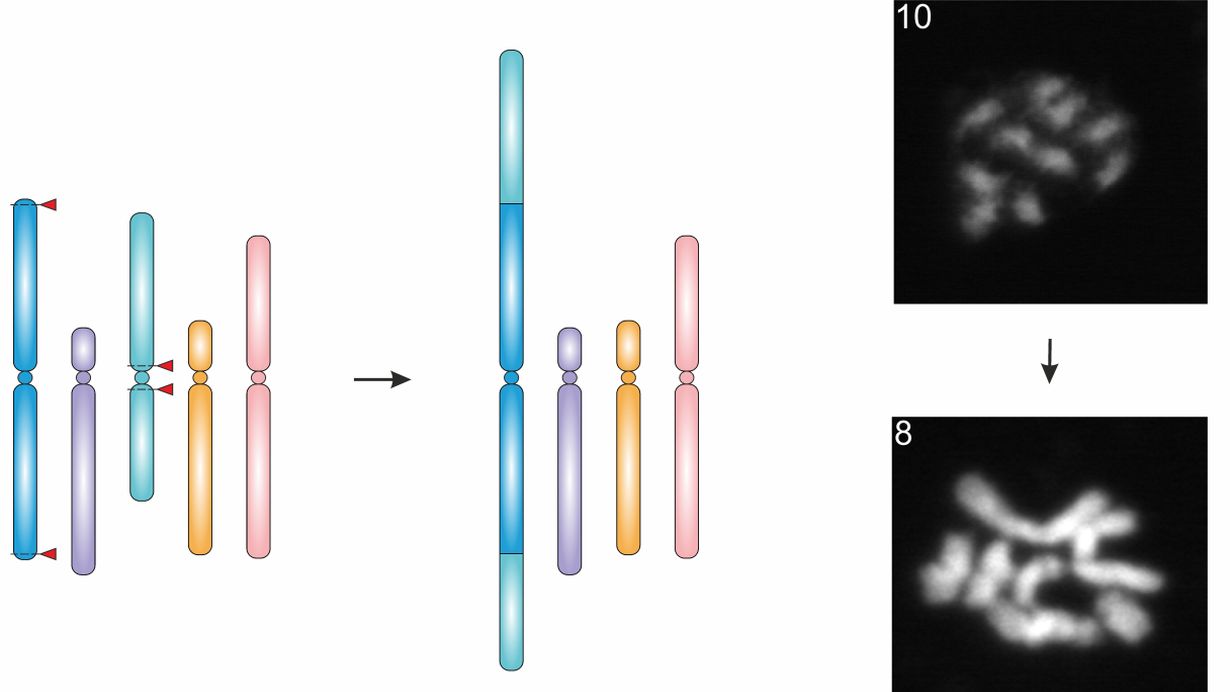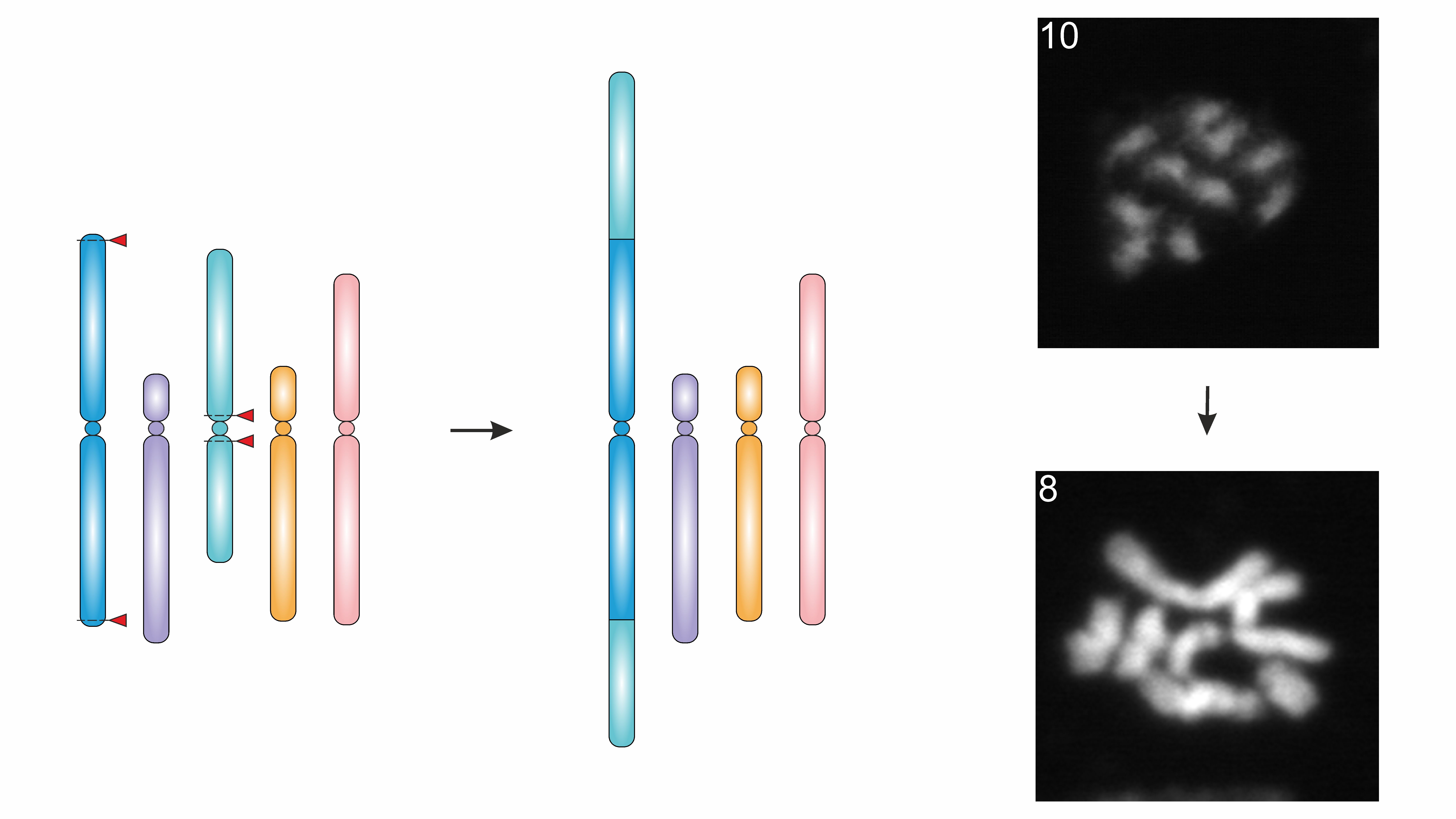Higher yields, greater resilience to climatic changes or diseases – the demands on crop plants are constantly growing. To address these challenges, researchers of Karlsruhe Institute of Technology (KIT) are developing new methods in genetic engineering. In cooperation with other German and Czech researchers, they succeeded for the first time in leveraging the CRISPR/Cas molecular scissors for changing the number of chromosomes in the Arabidopsis thaliana model organism in a targeted way – without any adverse effects on plant growth. This discovery opens up new perspectives for plant breeding and agriculture. The results have been published in the Science journal. (DOI: 10.1126/science.adz8505)
The CRISPR/Cas molecular scissors (CRISPR stands for Clustered Regularly Interspaced Short Palindromic Repeats) enabled the KIT researchers in recent years to alter not only genes, but also chromosomes. This way, it is possible to combine wanted traits or eliminate unwanted ones in plants in a targeted manner. “Now, we have achieved a new breakthrough: We succeeded in changing the number of chromosomes in the Arabidopsis thaliana model organism, also called “thale cress”, using gene scissors,” says Professor Holger Puchta from KIT’s Joseph Gottlieb Kölreuter Institute for Plant Sciences (JKIP), who is a pioneer in this field. “The importance of chromosomes lies in the fact that they serve as units that contain multiple genes, which are inherited together.”
Chromosomes are tiny, filamentous structures in the cell nuclei of living beings. They contain genes with genetic information, for example related to the development or control of diseases. Every living being possesses a particular number of chromosome pairs that it inherited from both parents. In human beings, for example, there are 23 pairs, i.e., 46 chromosomes altogether, tomatoes have 12 pairs, thus 24 chromosomes. Thale cress, however, possesses only five chromosome pairs, which means ten single chromosomes. A deviation from this number often causes adverse effects. “Up to now, it was not clear how a change in the number of chromosomes influences plants,” says Puchta. “Surprisingly, our experiments showed that this has no adverse effects on their development.”
New Possibilities for Gene Combination
In order to reduce the number of chromosomes, the researchers purposefully transferred both arms of a chromosome onto those of another one. This way, they succeeded in fusing two chromosomes into one. Since identical chromosomes in the cells of plants always exist in pairs, the resulting plants had only eight instead of ten chromosomes – i.e. four instead of five pairs. “During evolution, the development of new plant species often entailed changes in the number of chromosomes,” explains Dr. Michelle Rönspies from the JKIP and lead author of the paper. “Now, we managed for the first time to reproduce such a process in a lab environment. This is a big step for us to better understand how genetic material can change.” The structural modifications were then confirmed by a team led by Professor Andreas Houben from the Leibniz Institute of Plant Genetics and Crop Plant Research (IPK) in Gatersleben by means of microscopy.
The study shows that specific modifications of the chromosome structure also allow manipulations of the way in which genes are recombined during reproduction. “This is especially interesting for plant breeding because it opens up the possibility to inherit particular traits in a more targeted way,” says Rönspies.
Altered Chromosome Number Affects Crossability
The effects on plant growth were investigated by a research group led by Professor Jiří Fajkus from the Central European Institute of Technology in Brno (Czech Republic). The researchers found that plants with eight chromosomes showed the same growth behavior as their counterparts with ten chromosomes.
While the plants did not exhibit any visible differences, their offspring that had been crossbred with normal plants contained significantly fewer seeds. “The reason is that the modified chromosomes were no longer able to correctly pair with unmodified ones during reproduction. This creates defective germ cells, which decreases fertility,” explains Puchta. “However, their fertility in pairing with each other is unaffected.”
Such modifications could potentially be used in the long term to isolate plants genetically from their wild relatives and thus prevent unwanted outcrossing. “Our results demonstrate how flexible plant genomes are when it comes to large-scale structural changes,” says Puchta. “Our approach provides a unique opportunity to gain further insight into the development of genomes and into potential bioengineering applications.”
Original publication
Michelle Rönspies, Solmaz Khosravi, Ondřej Helia, Alessandro Valisi, Jiří Fajkus, Miloslava Fojtová, Andreas Houben, Holger Puchta: CRISPR/Cas-mediated heritable chromosome fusions in Arabidopsis. Science, 2025. DOI: 10.1126/science.adz8505.
In close partnership with society, KIT develops solutions for urgent challenges – from climate change, energy transition and sustainable use of natural resources to artificial intelligence, sovereignty and an aging population. As The University in the Helmholtz Association, KIT unites scientific excellence from insight to application-driven research under one roof – and is thus in a unique position to drive this transformation. As a University of Excellence, KIT offers its more than 10,000 employees and 22,800 students outstanding opportunities to shape a sustainable and resilient future. KIT – Science for Impact.


 Gentechnik_ pflanzliche_Chromosomenzahl_veraendern
Gentechnik_ pflanzliche_Chromosomenzahl_veraendern